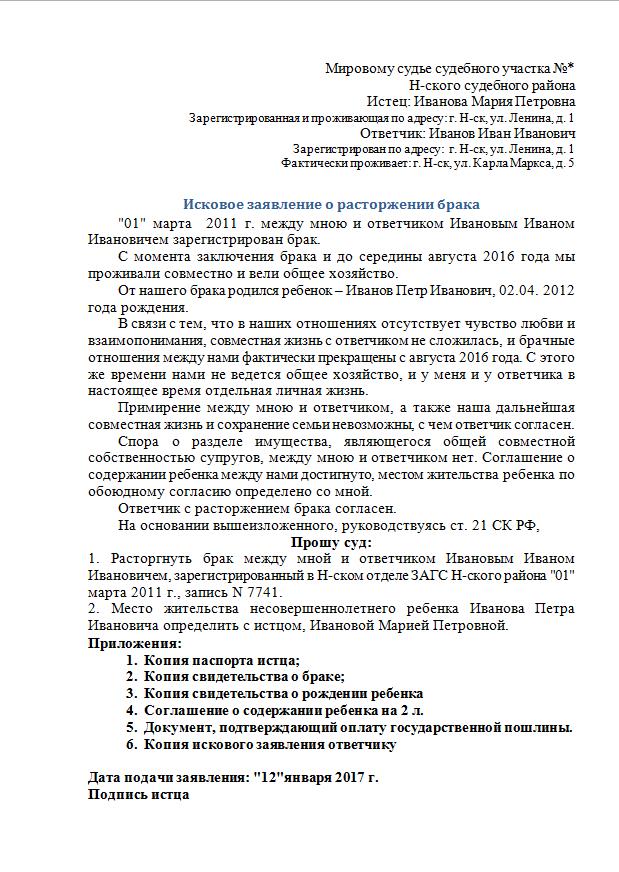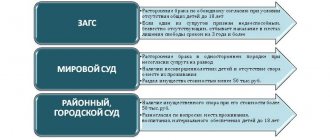242
Even if the spouses do not have minor children, the divorce procedure can result in a serious conflict. And the very fact of having children not only significantly complicates the formal process of divorce, but in some cases limits the right to initiate divorce on the part of the husband.
Where to start a divorce if there is one or more minor children in the family? As a general rule, divorce in such a situation is allowed only in court.
Rules and conditions for divorce in the presence of small children: up to one year, up to three years
The termination of family relationships inevitably entails a change in the child’s living conditions and affects the level of his financial support. In order to guarantee the preservation of a decent quality of life for a child, the legislator has limited the possibility of divorce without a trial, even in the absence of disputes between spouses.
Important! In addition to the divorce process itself, the court decides the issue of the child’s place of residence after the divorce, issues of collecting alimony and the participation of both spouses in his upbringing.
Features of the trial:
- if the spouses have no disagreements on these issues, the divorce court will take place as quickly as possible;
- If the spouses have a dispute over the issues of raising children, the divorce process will be aimed at protecting the interests of the child and maintaining living conditions for him that are as close as possible to the previous standard of living.
If the child is under 1 year old
The general procedure for divorce in the presence of children remains unchanged. However, a man's right to demand a divorce is significantly limited by family law. This is done to protect the interests of not only the spouse, but also the child, and is also due to possible stress and deterioration of the relationship in the period after the birth of the child.
Restrictions on divorce with a child under 1 year old and when the wife is pregnant:
- the husband has no right to demand a divorce during his wife’s pregnancy;
- The husband does not have the right to demand a divorce if the joint child is under 1 year old.
If the child was stillborn or died subsequently, a similar restriction applies until 1 year has passed from the date of birth of the baby.
In all cases where the husband's right to initiate a divorce is limited, the divorce can only be effected with the consent of the wife. If such consent is absent, the child's father has no legal grounds to file a claim for divorce, except in cases of simultaneous challenge of paternity. If paternity of a joint child is challenged, then the court is obliged not to take the listed restrictions into account (Article 17 of the RF IC).
If the child is under 3 years old
If there are minor children under the age of 3 years, there are no restrictions or features in the process of divorce tied to the age of the child. However, by virtue of the provisions of Art. 90 of the RF IC, during divorce proceedings, the mother of the child has the right to establish alimony for her maintenance until the child reaches the age of 3 years.
This obligation of the husband is established by a court decision simultaneously with the decision on the issue of financial support for the child. When the last child reaches the age of 3 years, payments for the maintenance of the wife, established by the court, are subject to termination.
Divorce in the presence of a child from 3 to 17 years old
In accordance with Art. 21 of the Civil Code of the Russian Federation (Civil Code of the Russian Federation), Art. 54 of the RF IC, a child is considered an individual until he reaches the age of eighteen. In a number of exceptional cases, we can talk about sixteen years (emancipation - Article 27 of the RF IC).
This suggests that, regardless of the child’s age (1 year, 3 years, 10 years, 17 years), the very fact of his presence in the family entails certain features in the dissolution of marriage between his parents:
- The complexity of the registration procedure (judicial process) - Art. 21 IC of the Russian Federation.
- In the registry office, divorce is possible, but when the children are not common (even though they are minors), as well as in exceptional cases established by paragraph 2 of Art. 19 RF IC.
- Determining the place of residence, communication and maintenance of the child. In this case, parents can also independently resolve these issues and submit an appropriate agreement to the court, or their decision will be left to the discretion of the court.
- From the age of ten, a child can express his opinion about which parent he would like to live with in the future (Article 57 of the RF IC), and the court is obliged to take his opinion into account when making a decision.
- The issue of child support (alimony) is resolved by the court in accordance with the requirements of Section 5 of the RF IC.
Where and where to file for divorce
Where to start, where to go if the spouses decide to end the marriage relationship, and the family has one or more minor children?
The Family Code of the Russian Federation allows for the only method of divorce in such a situation - only through the court!
However, in exceptional cases, divorce with a child is allowed through the registry office.
MARRIAGE REGISTRY. Conditions
In exceptional cases, the law allows divorce in the presence of children through the civil registry office.
As an exception, termination of family relations through the civil registry office is allowed even if there are children in the following cases:
- a court decision on incapacity has been made in relation to one of the spouses, or the fact of unknown absence has been confirmed;
- a sentence of real imprisonment for a term of more than three years was passed against the husband or wife.
In this case, divorce is allowed without a trial even if there are children.
In the listed cases, it is enough to contact the registry office for the spouse who wants to get a divorce, and this application will be granted regardless of the presence of children.
In any other cases, you cannot apply to the registry office for divorce if you have a child.
In what cases can you not file for divorce?
The husband cannot initiate the termination of the marriage during his wife’s pregnancy or within one year from the day the newborn was born, without the permission of his wife. The Supreme Court of Russia clarified the above rule of family law, noting that it applies to cases of stillbirth or the death of a newborn before he reaches one year of age.
It should be noted that the actions of government agencies dissolving marital relations when the husband submits a document initiating a divorce are as follows:
- The registry office is obliged, upon receiving from the wife a certificate certifying pregnancy or a birth certificate confirming the age of a minor less than one year, to return the application to the husband.
- Upon receipt of the documents specified in paragraph 1, the judge is obliged to return the claim document to the husband, and if the judge has begun to consider the case, he is obliged to stop considering it.
If, however, the court dissolves the family relationship in violation of the requirements of Article 17 of the Family Code, then its decision can be reversed on appeal.
The provisions of Article 17 of the Family Code do not prohibit a wife from:
- Independently submit the necessary documents to the court or to the registry office, regardless of your pregnancy or the presence of a newborn child. The spouse's consent is not required.
- Agree with the husband’s request for divorce submitted to the court or the registry office.
Which court should I file for divorce in?
Magistrate's Court. Conditions
Divorce of marriage falls within the competence of magistrates. The magistrate's court must consider all claims for divorce if the spouses have minor children, but an agreement has been reached between them on the further procedure for raising the children and their place of residence.
Thus, the magistrate’s court has jurisdiction over cases of divorce:
- if the spouses have children together;
- if there is no dispute between the spouses about the order of their upbringing and place of residence.
Simultaneously with the claim for divorce, a demand can be made to determine the place of residence of the child or to establish a procedure for communicating with him, and other disputes may also arise regarding the future fate of the children. Such a dispute will be heard in the district court.
If, at the time of filing the claim, the spouses reached an agreement on the procedure for raising joint children, and during the court hearing they had a dispute and a clarifying statement of claim with new requirements was filed, the magistrate will be obliged to transfer the divorce claim to the district court of jurisdiction.
District Court. Conditions
District (city) courts will consider claims for divorce if there are children in the following cases:
- the spouses were unable to reach an agreement on with whom the child would live;
- the claim states a requirement to determine the child’s place of residence;
- the question is raised about establishing a procedure for communication with the child or limiting such communication on the part of the second spouse.
Also, the divorce case will be transferred to the district court if, along with the divorce, the spouse submits a demand for the division of property worth more than 50 thousand rubles.
What to do if the plaintiff does not appear in court
In this case, the defendant needs to find out:
- Did the plaintiff request that the trial be held without his personal presence or not? If information about the request is available in the case materials, for example, in a statement of claim or in a written petition, then the divorce process will continue as usual.
- Was the plaintiff notified of the place and time of the trial? If not, then the judge is obliged to postpone the trial. If there was, then the defendant should ask the judge if he has information about the reasons for the other party’s failure to appear and whether these reasons are valid. If the reasons provided by the plaintiff are valid, the judge is obliged to postpone the proceedings. If not, then the judge asks the defendant whether he is ready to resolve the divorce dispute on the merits? If the defendant refuses, the hearing is postponed.
- If the plaintiff does not come to the second hearing in a row, regardless of the reasons, and does not ask the court to complete the divorce proceedings without his personal presence, then the fate of the case is in the hands of the defendant. If the defendant refuses to continue the trial, the judge is obliged to terminate the process.
How to file for divorce if you have minor children
Statement of claim
As a general rule, an application for divorce is submitted to the magistrate's court at the defendant's place of residence.
The Code of Civil Procedure of the Russian Federation provides exceptions to this rule:
- the spouse with whom the minor child lives has the right to file a claim for divorce in the court at his place of residence;
- a spouse who, for medical reasons, is deprived of the opportunity to leave his place of permanent residence, also has the right to apply to the court at his place of residence.
Place of residence is considered to be the place of official registration (permanent or temporary). Actual residence without registration cannot be used as a justification for filing a claim in court.
Example. If the defendant is registered in Volgograd, but actually lives in Moscow without registration (even temporary), then the claim must be filed in the Volgograd court at his place of registration.
Preparing a claim
You can draw up a statement of claim either yourself or seek help from a lawyer.
Currently, on the Internet you can find a lot of different samples for divorce with children, but all of them must necessarily comply with the requirements of Art. 131-132 Code of Civil Procedure of the Russian Federation.
The statement of claim must contain the following information:
- Name of the court, its address.
- Full names and addresses of the parties, their contact details.
- Information about the marriage.
- Reasons for divorce.
- Information about children, about consent reached or not reached.
- Justification for leaving the child behind.
- Requirements addressed to the court: divorce, child’s place of residence, alimony, etc.
Sample statement of claim 2021
The presented sample reflects only the simplest situation with a divorce without disagreement on the issue of raising children. To file a claim for divorce with children, complicated by the requirement to determine the child’s place of residence, it is best to contact an experienced lawyer.
Sample statement of claim

Divorce documents with minor children 2021
The list of documents that must be attached to the claim for divorce is prescribed in Art. 132 Code of Civil Procedure of the Russian Federation. However, the law does not establish a clear list for claims for divorce and the applicant must determine the list of documents in relation to each case. An experienced lawyer can help in this matter.
Typical list of documents for divorce:
- a copy of the claim for the defendant;
- fee payment receipt;
- copies of the applicant's passport;
- a copy of the marriage certificate;
- information about the place of residence of minor children (certificate);
- additional documents for each of the additional claims filed simultaneously with the divorce;
- a document confirming payment of the state fee in the amount of 600 rubles.
If the application is submitted by a representative, a power of attorney must be attached. It is allowed to attach a copy of the power of attorney, but only if the representative plans to participate in the meeting and submits the documents in person. When sending a claim by mail, it is best to attach the original or a notarized copy.
At the stage of filing a claim for divorce, the court will not require any other documents. During the court hearing, on their own initiative or at the request of the court, the parties may present additional evidence relevant to the case. These may include certificates from the place of work (when deciding on the amount of alimony), characteristics from the place of residence or service (when determining the child’s place of residence).
The composition of additional documents for each case of divorce is individual and can only be determined in advance by an experienced lawyer. contact our expert lawyer right now and provide yourself with a reliable evidence base in court!
Copy of the claim
A copy of the statement of claim is attached simultaneously with the filing of the main claim and is intended for the defendant.
It is impossible to independently transfer the claim to him by sending it by mail, as this can be done under the CAS or APC procedure - in civil proceedings, the court itself sends documents to the parties.
In addition, a copy must be attached for third parties, if they will participate in the case - for example, guardianship and trusteeship authorities.
You can make a copy in several ways:
- print out several copies of the claim and sign them;
- make a photocopy of the already signed statement of claim.
The law does not establish specific requirements for a copy of a claim; in practice, courts even accept handwritten copies copied from the original.
Copy of the passport
A copy of the passport is attached to confirm the identity of the applicant and to simplify the entry of primary data about the applicant by court staff.
The requirement to provide a copy of a passport is not specified in the legislation, but was formed in the course of law enforcement practice. A copy of your passport is not required.
When submitting an application in person, you can present the original passport to the court staff and not attach a copy. But often court officials themselves copy the passport and attach a copy of it to the case.
Marriage certificate
Unlike the registry office, where submission of a marriage certificate is mandatory (and then only to the registry office that did not register the marriage), it is enough to submit a marriage certificate to the court.
This is often required when the marriage certificate:
- lost;
- destroyed;
- held by the second spouse.
If there are difficulties in obtaining a duplicate of the certificate or even a marriage certificate, the plaintiff has the right to petition the court to request these documents.
Certificate of children's place of residence
When dissolving a marriage, taking into account the interests of the children, the applicant needs to confirm the fact that the child lives with him or, conversely, notify the court that the child lives with the second parent.
Most often, this document should be presented in cases where there is no dispute about the place of residence of the children as evidence that the place of residence of the child has already been determined, is known to the second spouse and is not disputed by him. A certificate will also be required to confirm the plaintiff’s right to choose jurisdiction at his place of residence.
Additional documents
When making additional demands in a claim for divorce in the presence of children, the plaintiff will need to present a number of additional documents.
Documents for disputes about children:
- conclusions of guardianship and trusteeship authorities;
- information about bringing the second spouse to administrative or criminal liability;
- information about the material and living conditions of the children’s place of residence;
- data on children’s leisure time, their provision, and pastime.
Documents for division of property:
- certificates of ownership of real estate and vehicles;
- purchase and sale agreements, checks and other documents confirming joint purchases;
- information about property valuation.
Documents for collecting alimony:
- information about the income of both parents;
- documents confirming the child’s special need for additional support (disability, serious illness);
- information about the child’s place of residence.
The listed examples of documents are for informational purposes only and depend on the severity of the dispute, the composition of the property, the reasons for the disagreement and a host of other factors. In each specific case, it is recommended to seek the help of an experienced lawyer who will accurately determine a comprehensive list of documents specific to your situation. Consult our specialists right now by asking them a free question.
State duty
When applying for divorce to the registry office or to the court, you must pay a mandatory state fee. Without making this payment, the application either to the registry office or to the court cannot be accepted for consideration.
| Method of divorce and other actions | Amount of state duty and when to pay |
| Divorce through the registry office | 650 rubles before filing an application for each spouse |
| Divorce through a magistrates' or district court | 600 rubles when filing a claim and the same amount will be recovered from the second spouse |
| Requirement to determine the child’s place of residence | Not taxed, because declared in the interests of children |
| Request for division of property | Calculated according to the rules for calculating the duty for a claim for division of property. It is paid by the plaintiff based on his share, then additionally collected from the defendant. |
| Applying to the registry office after the court decision has entered into force for the issuance of a divorce certificate | 650 rubles from each spouse |
The state fee must be paid before going to court. Without supporting documents (original receipt), the judge first leaves the claim without progress, and then, if the fee is not paid, returns the statement of claim. For more information about the size of the state duty and the procedure for its payment, read the article “How much does divorce cost in 2021?”
How does the divorce process work if you have minor children?
The official basis for initiating divorce proceedings is the filing of an application to the court by one of the spouses. The claim can be filed either by the plaintiff in person or by sending it by registered mail.
The judicial divorce procedure involves several stages, regulated in detail by procedural legislation.
The divorce process consists of the following stages:
- Submitting a statement of claim to the magistrate's court in accordance with the rules of jurisdiction.
- Initiation of divorce proceedings by the court.
- Sending the defendant (second spouse) a copy of the statement of claim and notice of the time and place of the court hearing.
- Conducting court hearings with the participation of both parties, or in their absence (if there is evidence of proper notification and in other cases provided for by law).
- Consideration of the issue of the child’s place of residence, obtaining the consent of the second spouse or studying his arguments against the applicant’s claim.
- Compliance with the condition on the possibility of reconciliation of the parties (the court has the right to give the spouses time to resolve the issue of continuing family relations, but not more than three months).
- Issuance of a judicial act satisfying claims for termination of marriage.
- Entry into force of the decision and its execution.
After filing a claim, the defendant has the right to present his objections to the statement. The defendant exercises this opportunity orally through personal participation in court hearings, or by submitting a written response indicating the grounds for objections.
To find out how the divorce process is going and to clarify the date of the next court hearing, the parties can use the special GAS system “Justice”, in which each magistrate or district court of the Russian Federation has its own publicly accessible page.
The procedure and stages of divorce with children through the magistrate's court
The procedure for divorce with children through the Magistrates' Court is as follows:
- Determination of jurisdiction.
- Filing a claim.
- Resolving the issue of accepting a claim.
- Preparing the case for trial.
- Court hearing.
- Examination of evidence.
- Debate of the parties.
- Making a decision.
- Deadline for appealing the decision.
- Entry of a court decision into force and its execution.
Determination of jurisdiction and filing a claim
Before preparing a claim, it is imperative to correctly determine the jurisdiction in order to exclude the return of the statement of claim.
The claim is drawn up in accordance with the requirements of Art. 131 of the Code of Civil Procedure of the Russian Federation, and the attached documents are formed taking into account the provisions of Art. 132 Code of Civil Procedure of the Russian Federation. Above is a list of information that must be included in the claim and possible attachments.
Resolving the issue of accepting a claim
Within 5 working days from the date of receipt of the claim, the magistrate or district judge must decide the fate of the submitted application. If all the provisions of the law are observed when drawing up the claim, then the application is accepted by the judge and a civil case for divorce in the presence of children is initiated.
| Judge's decision | Causes | Plaintiff's actions |
| The application was left without progress | The claim was filed in violation of the requirements of Art. 131 Code of Civil Procedure of the Russian Federation or Art. 132 Code of Civil Procedure of the Russian Federation | Attach missing documents or re-draft the claim |
| The application was returned along with documents |
| Eliminate these shortcomings and file the claim again (in the correct court). |
| The claim was denied | There is already a decision in the case between the same parties and on the same dispute. | Repeated appeals regarding a dispute already resolved by the court are not permitted. |
A private complaint is filed against the ruling, if it interferes with the further progress of the case, within 15 days from the date of issuance. In all cases, the plaintiff has the right to both take measures to eliminate the problems indicated by the judge and appeal the court decisions to a higher authority.
Preparing the case for trial
When the judge accepts the claim for proceedings, he issues a ruling on preparing the divorce case for consideration.
The definition specifies the actions that both the plaintiff and the defendant must take before the hearing.
Most often, the list of actions is of a typical nature (submit original documents, prepare an objection), but it is possible to order specific actions that relate exclusively to a given case. For example, provide a certificate of the child’s place of residence or obtain an inspection report of living conditions from the guardianship authorities.
Court hearing
The court notifies the parties in advance of the date and time of the hearing.
It is highly advisable to appear at the court hearing in person or, if such an appearance is not possible, to notify the court in advance by telephone or in a written statement of the reasons for failure to appear.
Both the plaintiff and the defendant may apply:
- postpone the hearing of the case for valid reasons (illness, business trip, untimely (less than 3 days) notification of the process;
- consider the case without your participation (in the petition you must indicate the reason and your attitude to the claim).
The court will return the claim without consideration if the plaintiff fails to appear twice when summoned and the defendant does not request a hearing. However, leaving without consideration does not deprive the plaintiff of the right to request a divorce again.
The participation of children in the court hearing is not required. But when deciding the issue of their place of residence, the court is obliged to take into account the opinion of children over 10 years old.
The court also pays special attention to the following issues:
- who supports the child at the time of filing the claim;
- with whom the children actually live;
- the opinion of the second spouse about his participation in raising the child;
- the position of the guardianship and trusteeship authorities if a request is made to determine the place of residence of a minor.
At the beginning of the court hearing, the judge hears first the plaintiff and then the defendant.
Examination of evidence and debate between the parties
At the court hearing, all evidence presented by the parties is carefully examined. The court may require original documents if they were submitted in copies, or request other information.
During the examination of evidence, the parties may give explanations and ask each other questions only with the permission of the presiding judge.
After examining the evidence, the court proceeds to debate.
During the debate, spouses can ask each other questions and express their opinions on the fact that certain circumstances have been proven. It is in the debate that the court's attention is focused on the facts established during the judicial investigation. Petitions may also be submitted.
Making a decision and appealing it
At the end of the hearing, the court retires to the deliberation room and announces the decision.
May be announced:
- the operative part of the decision, which contains only an indication of the parties present in court and the essence of the decision made;
- a reasoned decision made in final form.
The period for appealing a judge's decision is 30 days from the moment the decision was prepared in final form. The date of production of the decision must be indicated in the certificate and differs from the date of issue. The deadline may be extended if missed for a valid reason.
If the decision permits a claim for alimony, it must be executed immediately. After the decision is announced, court employees must prepare a writ of execution for the collection of alimony and within one working day submit it to the FSSP service for execution.
Entry of a court decision into force and its execution
If the court verdict is not appealed within 30 days, the decision is considered to have entered into force.
With the received decision, the former spouses, jointly or in turn, apply to the registry office to obtain a divorce certificate issued on the basis of a court decision.
Determining place of residence: who will the children stay with?
According to established practice, young children most often remain with their mother after a divorce.
This is because a child under 10 years of age primarily needs the care of the mother. Children under 3 years of age certainly remain with their mother, unless there are exceptional circumstances that pose a threat to the health and development of the baby.
These include cases where the mother:
- evades responsibilities for his maintenance and upbringing;
- was held accountable for failure to fulfill the duties of a parent;
- leads an immoral lifestyle (drinks, uses drugs);
- does not have the opportunity to ensure decent development and upbringing of the child.
In the event of a mother’s dishonest behavior towards her own child, the father has every chance of keeping the minor, regardless of his age.
Moreover, if there are several teenage children, the court may well decide to leave the daughter with the mother, and the son with the father, or even vice versa. The preferences of the children, their hobbies, the financial support of each parent and other factors are taken into account.
It is older children, teenagers, who most often stay with their father:
- they often express this desire themselves.
- at this age, significantly more funds are required to support children (education, clothing, accessories) and it is due to high material well-being that the courts can decide to transfer the children to the father.
Read more in the article “What to do if the husband wants to take the child away during a divorce.”
Arbitrage practice
The case was heard in the Oktyabrsky District Court of Grozny, Chechen Republic in October 2021.
The plaintiff in this case was the wife. The demands put forward to her were:
- Dissolve marital ties with your husband.
- Determine the amount of child support for your daughter.
- Divide joint assets, namely a car.
- Claim expenses spent on a representative and the court.
In turn, the husband demanded from the court:
- Decide which parent his daughter will live with.
- Determine how often she will communicate with the parent living separately from her.
According to the explanations given by the wife, the court had the following picture of what happened: the spouses do not live together because they dislike each other; the husband does not want to voluntarily give money to support his daughter and does not want to pay for kindergarten. Also, the wife was against giving the girl to her husband and asked to divide the car in half, obliging the husband to pay her her share in money.
The plaintiff additionally said that she was currently pregnant, and the defendant knew about it. However, she agrees to the divorce and does not want to reconcile with her husband.
According to the defendant, it turned out that he partially agrees with the plaintiff’s claims. He also explained to the judge that he had previously wanted to make peace with his wife several times, but she constantly refused him this. For this reason, he agrees to get a divorce and pay alimony, but insists on reducing it.

The defendant believed that his daughter should be left to him, since his and his wife’s living conditions are the same, but the plaintiff does not give him the opportunity to communicate with her. This is expressed as follows:
- The wife transferred the girl to another kindergarten and did not notify him about this.
- The plaintiff turns her daughter against the defendant and thereby causes her psychological trauma.
Regarding the division of the car, the husband pointed out the following important fact: he bought it with funds received as a gift from his father.
As for the opinion of the representative of the guardianship and guardianship institution, she stated that the girl should be given to her mother due to their psychological attachment to each other, but the defendant should have the opportunity to see the daughter.
As a result, the judge came to the following conclusions:
- Since the plaintiff is pregnant and agrees to dissolve the marital bond, the court has no grounds to prevent the termination of the marriage.
- The girl must be left with her mother in her interests.
- The claims of the defendant, who asked to determine the frequency of meetings with his daughter, must be satisfied. The court approves the schedule drawn up by the defendant, namely from 10:00 Saturday to 18:00 Sunday weekly.
- Due to the fact that the husband agrees to pay alimony allowance at a fixed rate, and the wife does not agree only with the amount of alimony, the court decided to take into account the opinions of the parties and set its amount equal to 5,000 rubles.
- The car was indeed purchased with donated funds, as evidenced by the donation agreement between the defendant and his father. Thus, it cannot be divided between wife and husband.
How long does the divorce process take?
The total duration of the trial for the termination of a marriage relationship is established by the Code of Civil Procedure of the Russian Federation and cannot exceed 1 month. In practice, this period may be extended for objective reasons (illness of the parties, lack of evidence of proper notification of the parties, etc.).
The standard period for divorce through the court may extend for another 3 months (Article 22 of the RF IC). The court may decide to give the spouses 3 months for possible reconciliation and preservation of the family. Providing this period is a right and not an obligation of the court. It is adopted based on all the circumstances of the case, including taking into account the presence of minor children in the family.
To speed up the trial, we suggest using the services of our experienced lawyer, who will ensure full representation of your interests in court and help with collecting the necessary evidence.
Divorce with two children
The fact that a family has 2 or more minor children does not directly affect the procedure for divorce proceedings. Only the duration and number of court hearings can increase significantly due to an increase in the volume of evidence considered, namely the attitude of the parents towards each of the children and the position of the children (who have reached the age of 10) on this issue.
Regardless of the number of children, the divorce court will have to determine the order of living and raising children after the end of the marriage. In this case, the presence of several children will inevitably complicate the final decision, especially if the spouses have disagreements.
The most optimal way to resolve the conflict is the mutual agreement of the spouses on all controversial issues, including the procedure for raising and communicating with common minor children, as well as the conditions for the appointment and payment of alimony. If an agreement is reached, the court will only have to make a positive decision.
In this case, the court can leave the children either with one of the parents or “separate” them, depending on the position of the parents and living conditions.
All these nuances will have to be proven in court, and the winner will be the party that enlists the support of an experienced lawyer from our company in advance. He will not only take care of all the troubles of drawing up a claim and collecting the necessary documents, but will also be able to represent your interests in court of any instance from the first hearing to appealing (if necessary) the decision.
Basic principles of property division

Property relations of spouses in the event of termination of marriage can be regulated by a marriage contract or by law.
The provisions of a prenuptial agreement are generally accepted unconditionally by the court unless its terms place either spouse at a severe disadvantage. An unfavorable situation means, for example, the following situation: according to the contract, all property purchased during marriage is transferred to the husband in the event of divorce. This condition clearly infringes on the interests of the wife, so the court almost completely recognizes it as invalid.
In addition, it should be taken into account that, according to a prenuptial agreement, during a divorce, both property purchased during the marriage and the personal belongings of each spouse can be divided. The only important thing is that the relevant provision is spelled out in the contract.
If the spouses did not enter into a marriage contract, then the division of property values occurs according to the norms enshrined in the Family Code. The division of property is based on the concepts of “joint property” and “personal property”.
Personal property cannot be divided. This includes:
- Shoes, cosmetics, toothbrushes, razors, clothing and other personal items, except luxury items and precious items.
- Assets owned by a spouse before the marriage began.
- Items that have become the property of a spouse under any gratuitous agreements and transactions, including those inherited.
Joint property is considered to be things that became the property of one or both spouses during marriage. These include:
- Salaries and other income, as well as profits from a business or investment.
- Stocks, bonds and other securities.
- Pensions and benefits.
- Shares in the capital of legal entities or credit institutions.
- Bank deposits.
- Any immovable or movable things.
- Shares in mutual funds or housing cooperatives.
- Money and other benefits received from intellectual activity.
In addition, two important nuances should be taken into account:
- A spouse who cared for young children or took care of the household during the marriage and did not contribute to the family budget has the right to part of the assets upon division.
- If a spouse has invested his money or labor into the personal asset of the other spouse and thereby significantly increased the value of this asset, then the judge has the right to recognize it as joint property.
Joint property can be divided between the wife and husband according to a notarized agreement between them. If it is missing, then the judge makes the division in accordance with the following principles:
- All assets are divided 50/50 between the spouses. The exception is cases when the judge has the right to transfer an increased share to one of the spouses, bearing in mind the interests of minor children or the immoral behavior of another participant in the marriage, who squandered family money or did not want to earn it due to unjustifiable reasons, for example, laziness, alcoholism, frivolous attitude towards life.
- Debts are divided according to the shares of the awarded assets.
- Children's property cannot be the subject of division.
- If the value of the things that were transferred to one of the participants in the marriage is higher than the value of his share, then the court obliges him (her) to transfer compensation to the other spouse, for example, in money or other property.
Divorce with three children
Divorce with 3 or more children is no different from the procedure for divorce with 2 children.
However, additional issues may arise that the court will need to resolve at trial.
Among them:
- the question of the separation of children from their parents;
- features of alimony collection;
- assessment of the living conditions of each spouse based on comfort and sufficiency for all 3 children.
The court may decide to separate the children, leaving one or more children with the father and the rest with the mother. When deciding this issue in relation to children over 10 years old, the opinion of the child himself must be taken into account.
Alimony
Simultaneously with the claim for divorce from minor children, a demand for the collection of alimony for child support may also be filed.
Alimony is collected:
- in the amount of ¼ of a parent’s total income per child;
- in the amount of 1/3 of all types of parent’s earnings - for two minors;
- in the amount of half of earnings - for three or more children.
A requirement to withhold alimony in a fixed amount may also be made if the parent-spouse does not have a permanent or regular source of income.
In this case, the cost of living in the region is taken as an approximate amount, because alimony collected in a fixed amount cannot be less than this amount.
List of documents for filing a claim

Both spouses, if there is a mutual agreement, or only the wife who has an infant child less than 1 year old and plans to begin divorce proceedings, submit the following documents to the court:
- Statement of claim in a number of copies equal to the number of participants in the proceedings.
- Marriage certificate.
- A certificate issued on the occasion of the birth of a baby.
- Documents for property assets, if a demand is made for their division.
- It is advisable to prepare a child support agreement and a child support agreement. This will speed up the legal process.
- A document indicating payment of the state fee, for example, a bank receipt.








